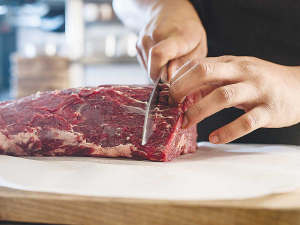Move over ham, here comes lamb
It’s official, lamb will take centre stage on Kiwi Christmas tables this year.
 Butchers across New Zealand are asking the Government to allow them to open under strict Covid protocols amid a level four lockdown.
Butchers across New Zealand are asking the Government to allow them to open under strict Covid protocols amid a level four lockdown.
Butchers across New Zealand are urging the Government to allow them to reopen under strict Covid protocols and serve their communities.
Currently, under Alert Level Four, independent butchers are only allowed to operate contactless deliveries – a position Retail Meat New Zealand (RMNZ) says is unviable for many operators.
Compounding the issue is that supermarkets are under increasing pressure, not just from a record concentration of customers, but for several supermarkets, they are a location of interest forcing their staff members into self isolation.
Kit Arkwright, spokesperson from RMNZ – the membership body for New Zealand butchers – says he is imploring the government to change their stance as soon as possible to give retailers a chance of survival.
“The reality for many of our members is an extended lockdown could sign the death sentence for their businesses,” Arkwright says.
He says the losses many butchers suffered during the 2020 lockdown combined with the current lockdown could see an eventuality where many butchers are unable to reopen.
“The Government has to consider the long term impacts this will have on food security, particularly for rural and regional communities that rely on their local butcher to keep them fed.”
Arkwright says that while RMNZ acknowledges that the whole country is feeling the impacts of this latest lockdown, but its members know they can do their part to keep Kiwis fed.
Fonterra’s impending exit from the Australian dairy industry is a major event but the story doesn’t change too much for farmers.
Expect greater collaboration between Massey University’s school of Agriculture and Environment and Ireland’s leading agriculture university, the University College of Dublin (UCD), in the future.
A partnership between Torere Macadamias Ltd and the Riddet Institute aims to unlock value from macadamia nuts while growing the next generation of Māori agribusiness researchers.
A new partnership between Dairy Women’s Network (DWN) and NZAgbiz aims to make evidence-based calf rearing practices accessible to all farm teams.
Despite some trying circumstances recently, the cherry season looks set to emerge on top of things.
Changed logos on shirts otherwise it will be business as usual when Fonterra’s consumer and related businesses are expected to change hands next month.

OPINION: Here w go: the election date is set for November 7 and the politicians are out of the gate…
OPINION: ECan data was released a few days ago showing Canterbury farmers have made “giant strides on environmental performance”.